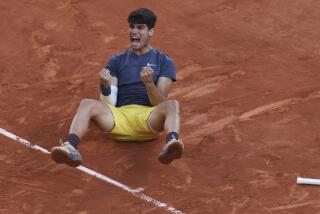Fernandez Too Steady for Zvereva : Tennis: Her play undermines an unpredictable, erratic and therefore dangerous opponent, 6-4, 6-3, in Evert Cup final.
- Share via
INDIAN WELLS — It’s best to expect the unexpected when playing Natasha Zvereva. The intelligent opponent would do well to determine what the high percentage shot is in any given situation and then assume that Zvereva will do the opposite.
Such was Zvereva’s tactical choice in Monday’s final of the $430,000 State Farm Evert Cup. The trouble with a high-risk game is, when imagination and talent fail, not even the odds are on your side. All of that failed Zvereva, and sensible Mary Joe Fernandez beat her, 6-4, 6-3, winning here for the second time in three years.
Fernandez’s reliance on the safe and predictable not only earned her the title at the Hyatt Grand Champions Resort, but moved her another step along her path to recovery from serious illness. And her victory was a reminder that brilliance can sometimes assume a sedate posture.
Perhaps Zvereva left her dashing shotmaking behind Sunday as both players remained on hold for hours while rain pelted the court.
The match was eventually rescheduled for Monday, when the sun shone brilliantly, even if the play did not.
The ninth-ranked Zvereva had been all dazzling volleys and sharp angles in beating No. 1 Arantxa Sanchez Vicario to reach the final. She admitted her concentration and control were not sharp in Monday’s match, but that understanding hadn’t prevented her from trying any number of risky shots against an opponent she had never beaten.
“You can never be sure of what is going through her head, what she is going to do,” Fernandez said. “One time (today) she hit a drop shot from nowhere and you are like, ‘Where did that come from?’ But she hits them in.
“You just have to be ready. You have to be ready that she is going to hit a couple of great shots unexpectedly and on the other hand, she might make a few unforced errors that she normally wouldn’t. You just really have to be focused.”
Zvereva’s shot selection was frequently daring and often puzzling. She tried several drop shots from the baseline, with mixed results. She insisted on racing to balls and volleying shots that others would have allowed to drop first, and in general seemed to produce the unexpected.
According to Zvereva, it’s all part of the plan.
“I feel comfortable doing those things,” she said. “Especially when I know that my opponent is not very good at that particular part, like running to the net. I believe I have to do that in order to beat my opponent or try to confuse her.”
Zvereva staved off four break points in the opening game and broke Fernandez in the fourth game to go up, 3-1. Her reckless positions and dangerous shots appeared to be paying off. But Fernandez served well and broke back in the fifth game and again in the ninth and held serve to win the first set.
Zvereva had success in the second set when she was able to control the net, where her great hands can produce sharply angled volleys. Talent has never been Zvereva’s lack.
The 23-year-old’s great promise is often clouded by her inability to win titles, however. She has been in 22 finals and has won only three. It is the kind of record that could give her the reputation as an underachiever.
“It seems like it takes a whole lot out of me to get to the final, mentally,” Zvereva said. “On the way to the final you keep playing really good players and when you get there, you still have to play one of the top players. I know I can do it, but it is very tough.”
The great players find a way to win. Fernandez’s triumph has been in finding a way to come back.
Ranked No. 12, she has only recently returned to consistent form after a yearlong struggle with endometriosis, a painful inflammation of the uterine lining that can affect the entire pelvic area.
Fernandez, 23, withdrew from the the 1993 U.S. Open and had surgery soon after. She must still take medication and works with a nutritionist to help her regain her strength.
Physical strength is often more easily recovered than mental composure, and with some athletes, long after an injury heals, the mental wounds hinder full recovery.
“This gives me the faith that I am still playing well,” Fernandez said. “It’s just a matter of putting it into play and doing it on a more consistent basis.
“It does take a long time, mentally, to believe in yourself again, especially when you haven’t played well in a long time. This gives me faith to continue.”
More to Read
Go beyond the scoreboard
Get the latest on L.A.'s teams in the daily Sports Report newsletter.
You may occasionally receive promotional content from the Los Angeles Times.











